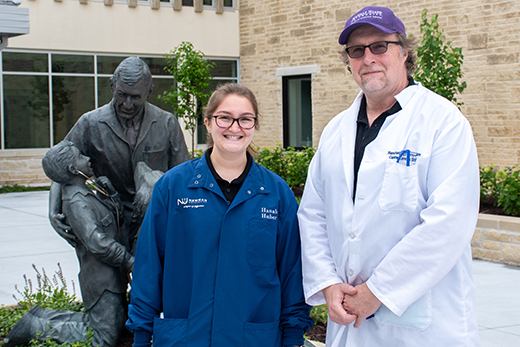University announces research collaboration to improve COVID-19 vaccine stability
Wednesday, Jan. 5, 2022

Robert DeLong, right, associate professor at the university's Nanotechnology Innovation Center of Kansas State, with second-year veterinary medicine student Hanah Huber. DeLong and other K-State researchers are part of a research collaboration with Tonix Pharmaceuticals that seeks to increase stability of mRNA vaccines, including those for COVID-19. | Download this photo.
MANHATTAN — Researchers at Kansas State University are expanding on an industry partnership to increase stability in mRNA vaccines — including those against COVID-19 — during transport and storage.
The agreement, coordinated by K-State Innovation Partners, is an exclusive license and option agreement and research collaboration with Tonix Pharmaceuticals.
Through the partnership, researchers will develop zinc nanoparticle, or ZNP, mRNA vaccines that replace the lipid nanoparticle, or LNP, technology in current COVID-19 vaccines. The new zinc nanoparticle technology confers increased stability to mRNA vaccines over a wide range of temperatures in model systems. The temperature-sensitive nature of zinc nanoparticle mRNA formulations limit vaccine shipping and storage to ultralow temperatures, which limits rapid global deployment. Under the research agreement, K-State will advance preclinical development of a new zinc nanoparticle mRNA vaccine to protect against COVID-19 based on the spike protein from SARS-CoV-2.
"The LNP technology of current mRNA COVID-19 vaccines limits our ability to deploy these vaccines in many parts of the world," said Robert DeLong, associate professor at the Nanotechnology Innovation Center of Kansas State. "The technology we have developed uses zinc to replace LNPs and results in more temperature stable mRNA vaccines."
DeLong said that zinc nanoparticles, unlike lipid nanoparticles, are stable over a range of temperatures, including room temperature. Eliminating the need for lipid nanoparticles in mRNA vaccines could speed deployment of new vaccines and make them more available globally. At scale, zinc nanoparticle-based mRNA vaccines may also be less expensive to manufacture.
DeLong will lead the vaccine research, along with colleagues Waithaka Mwangi, professor of diagnostic pathobiology in the K-State College of Veterinary Medicine, and Juergen Richt, director of the Center of Excellence for Emerging and Zoonotic Animal Diseases and director of Center on Emerging and Zoonotic Infectious Diseases.
"Our goal in utilizing a new mRNA formulation technology is to vaccinate people all over the world to save lives globally and reduce the emergence of variants of COVID-19 that can evade vaccine immunity," Mwangi said.
According to the Center for Disease Control and the Food and Drug Administration, the mRNA vaccines developed by Pfizer/BioNTech and Moderna based on lipid nanoparticles have been shown to prevent COVID-19 for up to six months after two doses and for longer with a booster. Because of the limitations of lipid nanoparticle technology, these mRNA vaccines require ultra-cold storage and transport because they are unstable at room temperature or even in standard refrigerators or freezers.
"The Pfizer/BioNTech and Moderna vaccines against COVID-19 have shown that mRNA technology is rapidly deployable and is likely to be one of the first lines of defense for future pandemics," said Seth Lederman, M.D., chief executive officer of Tonix. "The ZNP technology invented and developed by scientists at K-State has the potential to make mRNA vaccines that are free from LNPs, which could improve the stability of mRNA vaccines at room temperature and facilitate their deployment in places without ultra-cold chain supply systems."
